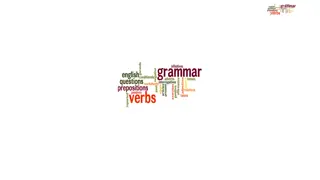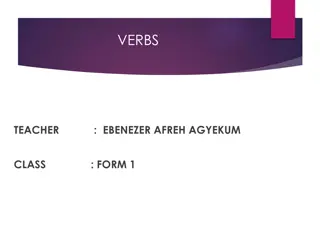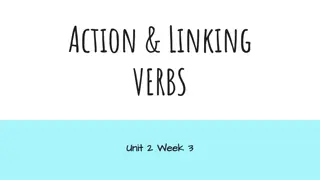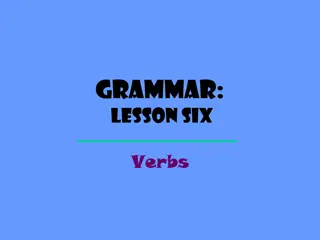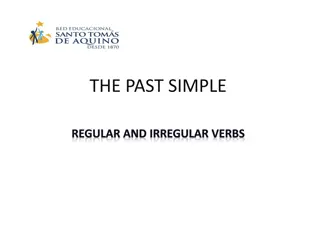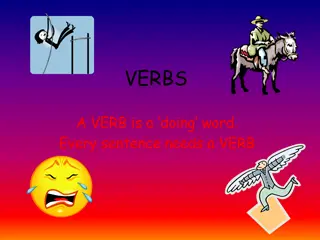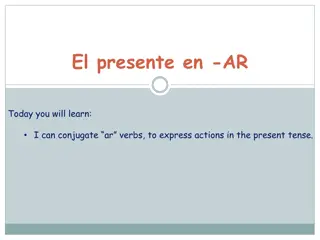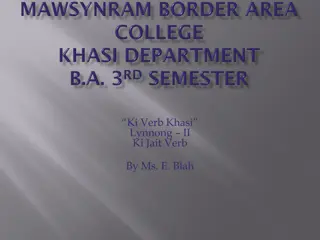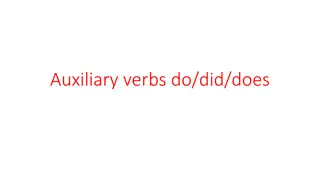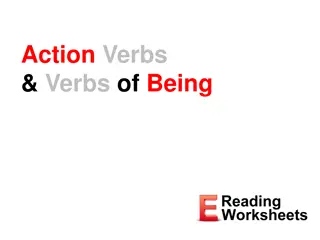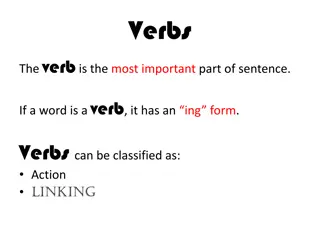Mastering Right Form of Verbs
Right form of verb is crucial in English grammar, indicating the correct form of a verb based on the subject and time. Learn about different rules like 3rd person singular, universal truths, present continuous, just now, and past time forms of verbs to enhance your writing skills and communication.
Download Presentation

Please find below an Image/Link to download the presentation.
The content on the website is provided AS IS for your information and personal use only. It may not be sold, licensed, or shared on other websites without obtaining consent from the author.If you encounter any issues during the download, it is possible that the publisher has removed the file from their server.
You are allowed to download the files provided on this website for personal or commercial use, subject to the condition that they are used lawfully. All files are the property of their respective owners.
The content on the website is provided AS IS for your information and personal use only. It may not be sold, licensed, or shared on other websites without obtaining consent from the author.
E N D
Presentation Transcript
Welcome to MYMENSINGH POLYTECHNIC INSTITUTE
2NDSEMESTER,2ST SHIFT UNIT-10,LESSON-01 USE THE RIGHT FORM OF VERBS
What is Right form of verb? Right form of verb indicates using the correct form of a verb in a sentence according to the form of the subject, time of the action/event, and other time indicating words or phrases in English grammar. Presentation title 3
To grasp the concept of the right form of verbs, we need to master the rules first.
Right form of verb Rule #1: 3rd Person & singular number If your subject is 3rd Person & singular number and the verb is in Simple Present Tense, then. Also, It is not applicable for other Tense. Add s / es to the verb to make it plural. Example: He drinks coffee. She eats rice. Presentation title 5
Right form of verb Rule #2: Universal Truths In the case of Universal truth & the habitual fact: The sentence is in Simple Present Tense. Example: The sun gives us light. Humans are mortals Presentation title 6
Right form of verb Rule #3: Present Continuous If the work is continuing at present: The verb is in the present continuous. Indicative words: now, at present, at this moment, etc. Example: She is singing now. He is reading. Presentation title 7
Right form of verb Rule #4: just, just now.., etc If a sentence contains just, just now, already, yet, ever, lately, recently, etc., then: The verb will be in the present perfect tense. Example: He has just left the house I have already done this research Presentation title 8
Right form of verb Rule #5: Past time If a sentence contains words indicating past time, such as yesterday, ago, long since, etc., then: The verb will be in the past form. Example: I went to my village home last week. Presentation title 9
Right form of verb Rule #6: No sooner hadthan If a sentence contains No sooner had . than , scarcely had when , hardly had before , etc., then: The first verb will be in the past participle form and the second verb will be in the past form. Example: No sooner had the thief seen the police than he ran away. Hardly had I reached the stop when they came. Presentation title 10
Right form of verb Rule #7: since If the first part of since is in present indefinite or present perfect tense then the next part will be past indefinite. Example: It has been many years since I came to Paris. If the first part of since is in past indefinite tense then the next part becomes past perfect. Example: It was many years since they had first met. Presentation title 11
Right form of verb Rule #8: nor, or, either.. When nouns or pronouns are joined by or, nor, either or, neither nor : The verb form usually agrees with the noun that is closest to the verb. Example: Neither the President nor the two houses are governing now. Presentation title 12
Right form of verb Rule #9: after If the first part of after is in past indefinite tense, then the next part will be past perfect. Example: The teacher started the class after Raju had come. Presentation title 13
Right form of verb Rule #10: while If the verb comes after while , then the verb will take ing with it. if comes after while + subject , then the verb will be in the past continuous tense. Example: While going to school, I saw a snake. Presentation title 14
Right form of verb Rule #11: to be and having The main verb after to be and having takes past participle form. Example: He ran away having taken the money. Presentation title 15
Right form of verb Rule #12: Future indicative words For future indicative words like by this time, by morning, by Sunday , etc., then: The verb will be in the future perfect tense. Example: They will have reached by this time. Presentation title 16
MD ISMAIL ASLAM Thank you Junior Instructor(English) Mymensingh Polytechnic Institute


